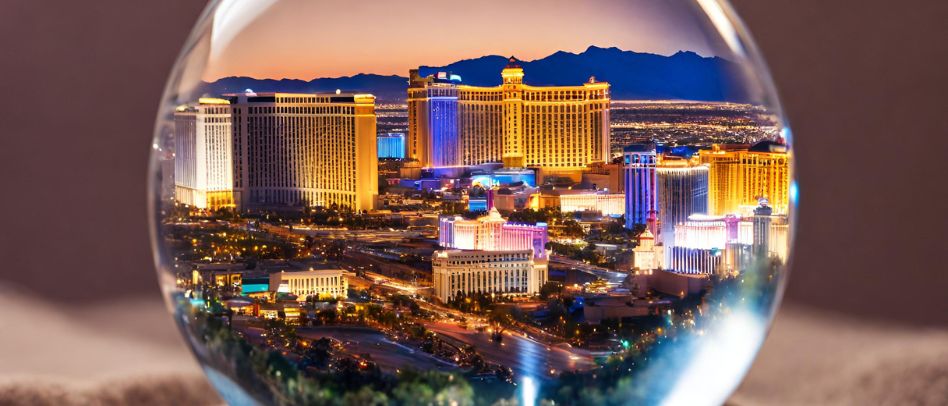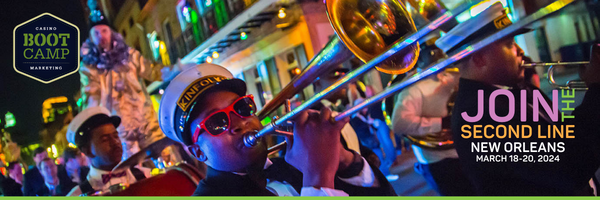Lights. Dice. Action!
Las Vegas, synonymous with gambling and glitz, has constantly reshaped itself throughout its history. The destination has thrived on reinvention. From casino-centric beginnings to family-friendly attractions and now a burgeoning sports mecca, this desert oasis thrives on reinvention. But here’s the secret: Las Vegas has never truly rebranded itself since the evolution of its iconic What Happens Here positioning. Instead, it has evolved its core strength – the promise of escape. Whether it’s the thrill of the roulette wheel, the spectacle of a Cirque du Soleil performance, VIP bottle service, or the adrenaline rush of a championship game, Las Vegas offers a temporary departure from our everyday lives.
Determining the history of branding for Las Vegas is a bit complex, as branding involves a continuous process rather than a single event. However, we can explore some key moments that significantly shaped Las Vegas’ identity and laid the groundwork for future branding efforts.
Early Influences:
- 1904: The Union Pacific Railroad tracks reached Las Vegas, easing travel and further connecting Las Vegas to the broader tourism market.
- 1920s-1930s: Prohibition fueled the rise of speakeasies and gambling, establishing Las Vegas as a haven for nightlife and entertainment.
- 1930s: Completing the Hoover Dam and Boulder Highway brought tourism and development to the area.
Shifting Identity:
- 1940s-1950s: Bugsy Siegel and other mob figures invested in luxurious hotels and casinos, transforming Vegas into a glamorous destination for celebrities and high rollers. This era solidified the association with opulence and excitement.
- 1990s: More commercialized family-oriented attractions such as the Luxor’s Nile River Tour and Treasure Islands’ Battles at Buccaneer Bay casinos. Theme parks and shows were introduced to broaden the appeal beyond gambling, marking a shift towards “something for everyone.”
- 1989 – present: Mega-resorts with themed attractions and integrated experiences redefined the Vegas landscape, further solidifying its image as a diverse entertainment hub.
Modern Branding:
- 2003: The iconic “What happens in Vegas, stays in Vegas” campaign – created by the Las Vegas Convention and Visitors Authority and R&R Partners – aimed to shift perceptions beyond gambling and emphasize a sense of freedom and escape, and this moment marked a deliberate, focused branding effort.
- From the 2010s onward: An increased focus on sports attractions, conferences, and luxury offerings aimed to diversify the audience and compete with other global destinations.
Therefore, instead of a single “first instance,” it’s more accurate to view Las Vegas’ branding as a continuous evolution:
- Early influences laid the foundation for its entertainment and escape reputation.
- Shifting identity through different eras shaped its offerings and target audience.
- Modern branding efforts refined and emphasized specific aspects to remain relevant.
Understanding this ongoing process gives a richer picture of how Las Vegas has built and adapted its brand over time.
Branding, you see, is about evolution, not revolution. It’s about taking the essence of what makes something unique and amplifying it to resonate with a broader and perhaps changing audience. Las Vegas has always been about escape, offering a world where you can shed your everyday worries and indulge in whatever your heart desires. This core value, this ability to transport individuals to a world of their choosing, is what makes Las Vegas truly special.
Indeed, the evolution of Las Vegas’ brand identity is a testament to its adaptability and relentless pursuit of capturing the zeitgeist of entertainment and leisure trends. While sports have become a significant part of its allure, the essence of Las Vegas remains its core brand identity as a place of escape, indulgence, and unparalleled experiences. This constancy amidst change is not a coincidence but a strategic branding effort emphasizing Las Vegas’ unique value proposition: offering an escape from the everyday.
I was recently asked to guess Las Vegas’s next rebrand, but as an experienced casino marketer who’s built my career on crafting iconic brands, I believe Las Vegas doesn’t need a rebrand. Instead, its future lies in refining and expanding its core strength: escape. Today’s travelers crave diverse experiences, personalized touches, and a connection to something bigger than themselves. Las Vegas can stay relevant in this shifting landscape, not with a complete overhaul, but in building upon its foundation, embracing new trends, and deepening the very concept of escape.
As we look toward the future, Las Vegas will likely continue to expand and diversify its appeal beyond sports without straying from its foundational brand identity. Here are a few directions Las Vegas could explore in its ongoing brand evolution.
Escape through Immersive Experiences:
As Las Vegas evolves into a digital entertainment and gaming hub, it’s leveraging the rise of esports, augmented reality (AR), and virtual reality (VR) to offer immersive experiences that draw a younger, tech-savvy demographic. This transformation taps into the city’s gaming heritage and propels it into the future of entertainment, where digital realms and personalized adventures redefine the visitor experience.
By integrating advanced technologies and offering hyper-personalized experiences, Las Vegas is staying true to its gaming roots and leading the charge into the future of entertainment. Venues like the HyperX Esports Arena,
MGM Grand’s Level Up, and Area15 exemplify the city’s commitment to digital innovation and immersive experiences, ensuring that Las Vegas remains at the forefront of the global entertainment industry.
Escape through Wellness and Sustainability:
Many Las Vegas operators are redefining their offerings to embrace wellness and renewal, moving beyond the destination’s renowned indulgence to cater to visitors seeking relaxation and rejuvenation. This emerging focus on wellness transforms the city into a destination for those looking for a different kind of escape, one that prioritizes health, mindfulness, and connection to nature. Luxury spa resorts and wellness retreats, such as the Canyon Ranch located inside The Venetian | Palazzo, offer comprehensive wellness experiences, including spa treatments, fitness classes, and meditation sessions.
The natural beauty surrounding Las Vegas, including areas like Red Rock Canyon, provides a unique opportunity for outdoor adventures that promote physical wellness and a connection to nature. Just a short drive from the Strip, Red Rock Canyon offers visitors a range of outdoor activities, from hiking and biking to climbing, amidst stunning desert landscapes. This emphasis on nature and outdoor activities is part of a broader trend toward eco-consciousness in Las Vegas, showcasing sustainability efforts such as water conservation, renewable energy, and local sourcing.
The city’s culinary scene is also embracing this wellness trend with an array of dining options that prioritize farm-to-table ingredients, plant-based menus, and innovative, health-conscious cuisine. This culinary evolution reflects a growing appetite for dining experiences that are both indulgent and nourishing, aligning with the overall shift toward wellness and sustainability.
Leading the charge in sustainable tourism, environmental initiatives at MGM’s ARIA Resort, The Park and T-Mobile Arena are setting new standards for the industry. Since opening its first LEED-certified development in 2009, the company has built all new construction projects in the US to LEED Gold standards.
Furthermore, The Venetian and The Palazzo’s sustainability efforts enhance Las Vegas’s reputation as a destination for eco-conscious travelers. These resorts have implemented a comprehensive approach to sustainability, from reducing their environmental footprint to promoting conservation and renewable energy use. Their efforts demonstrate a commitment to creating a sustainable future for Las Vegas, aligning with the city’s transformation into a wellness and renewal destination.
In this way, Las Vegas is redefining itself, offering a unique blend of wellness, sustainability, and luxury. This shift not only caters to the changing preferences of today’s travelers but also positions Las Vegas as a leader in the global movement towards more sustainable and mindful tourism.
Escape through Art and Culture
While Las Vegas might be synonymous with dazzling lights and thrilling entertainment, its potential to evolve into a cultural and creative hub shouldn’t be underestimated. By fostering diverse forms of artistic expression and intellectual engagement, the city can attract a broader audience seeking escapes that nourish the mind and soul beyond the usual glitz and glamour.
Pioneering Art on the Strip: Steve Wynn’s Vision
The influence of Steve Wynn, a casino mogul with a deep passion for art, cannot be overstated when discussing Las Vegas’ cultural aspirations. In 1998, he opened the Bellagio Gallery of Fine Art, a bold move within the traditionally casino-centric landscape. This stunning gallery housed renowned masterpieces from Van Gogh and Picasso, instantly elevating the perception of Las Vegas beyond mere entertainment. Wynn’s vision didn’t stop there. He infused his subsequent resorts with carefully curated art collections, including the iconic Jeff Koons “Tulips” sculpture and Picasso’s “Le Reve” at Wynn Las Vegas, further blurring the lines between luxury and cultural enrichment.
The Bellagio Gallery was just the beginning. The city now boasts a vibrant art scene with renowned institutions like the Nevada Museum of Art and the Las Vegas Art Museum. The AREA15 immersive entertainment complex hosts cutting-edge interactive art installations, pushing the boundaries of traditional museum experiences.
Performing Arts Take Center Stage
The Smith Center is a testament to Las Vegas’ commitment to the performing arts. This world-class venue hosts Broadway shows, renowned orchestras, and acclaimed dance companies, drawing in audiences who appreciate the transformative power of live theater and music.
Preserving the Past as Art: The Neon Museum
Las Vegas’ iconic neon signs deserve recognition as vibrant works of art. The Neon Museum is a fascinating repository of these illuminated relics, chronicling the city’s visual history and artistic evolution. This open-air “Neon Boneyard” is not just a nostalgia trip but a reminder of the artistry and craftsmanship that shaped Vegas’ unique visual identity.
Opportunities abound for Las Vegas to become a hub for artistic expression and cultural exploration. Las Vegas can offer a genuinely captivating escape that resonates with a diverse audience seeking more than just a fleeting thrill. The legacy of pioneers serves as a reminder that cultivating a cultural dimension strengthens the city’s unique narrative and ensures its enduring appeal in the years to come.
By deepening the escape concept, Las Vegas can cater to a broader audience, from families seeking adventure to wellness enthusiasts and digital nomads.
Remember, the magic of Las Vegas lies in its ability to transport individuals to a world of their choosing. By leveraging technology, focusing on sustainability, and fostering connection, Las Vegas can refine its existing brand and remain the ultimate escape for years to come.



Recent Comments